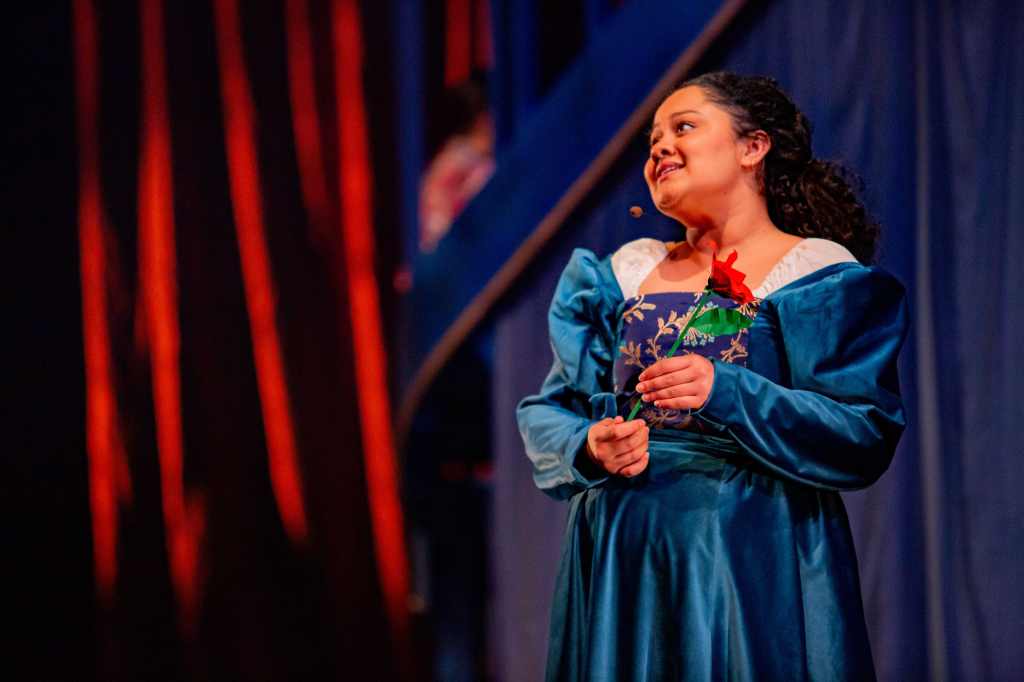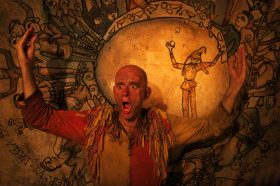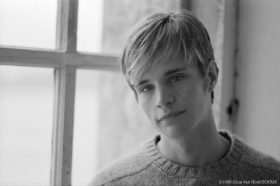Emilia is a mix of imagination and fact, period history and contemporary flavouring but most of all it is a strident feminist reckoning. Written by English playwright Morgan Lloyd Malcolm, it had several successful seasons in London, and won three Olivier Awards (for Best Entertainment or Comedy Play, Best Costume Design and Best Sound Design), before its Australian premiere in Melbourne, so its opening was already weighted with a heavy sense of expectation.
Based on the life, loves and losses of Emilia Lanier née Bassano (1569-1645), the play takes the few known truths about this historical figure and scaffolds a story around them. Gossip and conjecture have led the 17th century poet and provocateur to be held up as a possible contender for being the ‘Dark Lady’ of Shakespeare’s sonnets but, if so, Emilia was more than his muse; she was a talented writer in her own right.
The only problem was that she existed at a time when there was patriarchal antipathy toward women wielding a pen and having professional clout as an artist of any standing. This would explain why her work has never been widely disseminated, let alone celebrated. With this play Malcolm has sought to redress this sexist anomaly by pushing her from the wings into the limelight.
This collaboration between Arts Centre Melbourne, Essential Theatre and Geelong Arts Centre was helmed by Director, Petra Kalive, who deployed three actresses to play Emilia between the ages of seven and 78 (Manali Datar, Cessalee Stovall and Lisa Maza). The trio are among the 13-odd cast comprising entirely diverse women and non-binary performers (who play multiple roles). This casting choice is a deliberate political statement to showcase those who would have historically been prevented from even acting in the Elizabethan era.
Here, Malcolm, ably assisted by Kalive, lets loose the motley cast to make as much noise as they can. Their very visibility signposts the ongoing struggle for gender and race-based representation, on stage and elsewhere.
The set design in this Australian iteration is practical but minimal; there is just a revolving staircase and heavy drapery. Though the performers are clothed in quasi-period costume, they are shod in Converse sneakers as a nod to contemporary times. It sets the tone for the production, which consists of quoted verse from both the Bard and Emilia’s own scribblings, as well as anachronistic modern slang. (At one point the court dance tutor says, ’Ladies, are we we ready to slay?’)
Though of course it’s all speculation, one of the play’s contentious claims is that not only was Shakespeare Emilia’s lover, but that he also shamelessly pilfered her words and placed them into his own plays. Behind every great man, as the saying goes, is a woman… One scene has her interrupt the action during the staging of Othello, remonstrating that even her name has been lifted for the play to use for Desdemona’s friend.
All three actors playing the titular role offer solid performances. Emilia is variously depicted as a young girl being taught how to to behave accordingly in court so as to attract high-rent suitors, a kept mistress to a count, a wife in a marriage of convenience, and a mother and and a teacher, before eventually being a published poet, writing and distributing subversive feminist literature of her own.
Datar, Stovall and Maza are on onstage throughout, watching over their past and future selves, sometimes in encouraging silence, other times with a murmuring prompt. The transition between the Emilias is smoothly handled and all three generations manage to imbue their performances with the right balance of wit, charm and rebellion.
Emilia was Italian, possibly of North African descent – the ‘Dark Lady’ could be a reference to the ‘dun’ complexion and ‘wiry hair’ that Shakespeare mentions in one of his sonnets – so the decision here to cast POC actresses to play her is a good one, with race and skin colour adding another level of discrimination.
Read: Emilia Bassano: From dark lady to shining star
On opening night there was a misstep that threatened proceedings: the original actor playing Shakespeare (Heidi Arena) was injured on stage not long into the first act. Fortunately, she was duly replaced by Izabella Yena, who stood in with a script in hand for the rest of the show. Kudos to Yena, who did a fine job given the circumstances.
In fact, all the cast members gave enthusiastic and energetic performances, although there was more than a touch of satirical glee when it came to portraying some of the male characters. Shakespeare, for instance was written and played with a level of smarmy pomposity, but Genevieve Picot’s role as Lord Henry Carey (Emilia’s patron) was more effective for playing it straight rather than for laughs. Emma J Hawkins also gave a good, feisty turn as Lady Margaret Clifford, who enlists Emilia to tutor her daughter.
The play after all, is also about the solidarity of women; Emilia finds some like-minded allies in court who champion her desire for self-expression and enjoys the camaraderie of washerwomen whom she teaches to read and write poetry.
There is some light-hearted dancing and singing and some gentle humour to leaven the narrative but, though Malcolm should be commended for reclaiming a lost voice, and providing a perspective on stymied female creativity, Emilia tries a little too hard to be a rousing feminist play. The result is it comes across as polemical and laboured in its attempts to forge a relevance to modern sexual politics. There is a heavy-handedness in the way it continually tells us how, throughout her upbringing and adult life, Emilia was schooled in not taking up space: ‘as she grows she also has to shrink’.
The fact that women have been oppressed, menaced and silenced throughout the ages is channelled repeatedly via the travails of its central character, who may well be based on a real historical person, but nonetheless is unambiguously relegated to being a symbol of repression and then, in due course, a firebrand.
Bombastic and very much a call to arms, there is passion aplenty but little subtlety in a production the main objective of which is to celebrate a trailblazer who disrupted misogynistic rule to forge her own path.
The incendiary final speech spoken by the eldest Emilia incarnation (Maza) that ends with: ‘If they try to burn you, may your fire be stronger than theirs, so you can burn the whole fucking house down’ reads like a platitudinous 21st century exhortation and a reminder that, in the #MeToo era, we are still dealing with sexism, inequality and harassment.
Emilia by Morgan Lloyd Malcolm
Arts Centre Melbourne
Director: Petra Kalive
Movement Director: Xanthe Beesley
Movement Associate: Jennifer Ma
Set Designer: Emily Collett
Costume Designer: Zoë Rouse
Composer and Sound Designer: Emah Fox and Sharyn Brand
Lighting Designer: Katie Sfetkidis
Cast: Manali Datar, Cessalee Stovali, Lisa Maza, Heidi Arena, Emma J Hawkins, Catherine Glavicic, Carita Farrer-Spencer, Genevieve Picot, Jing-Xuan Chan, Amanda LaBonté, Sonya Suares, Sophie Lampel, Sarah Fitzgerald
Emilia will be performed until 27 November in Melbourne before touring to Canberra from 1-3 December 2022.





